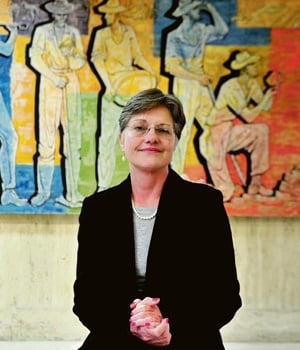
Johannesburg - Craggy-faced men with calloused hands, some clenched involuntarily, some gripping the table, stare intensely at the diminutive Dr Elize Strydom as she tells the mine workers what South Africa’s gold companies are offering them in this year’s wage negotiations.
There is dead silence in the chamber, where 150 men from four unions are sitting.
The chief negotiator for the Chamber of Mines is inwardly as anxious as the men in the room because a lot is riding on a successful outcome for an industry battered by falling commodity prices and labour unrest.
The shine from the gold that once made South Africa’s economy gleam internationally is fading.
Nobody knows this better than Strydom. For 13 years she’s been listening to the unions before informing mine bosses about their demands. She is the one who must return to the negotiating table with the mandate given to her by the Chamber of Mines’ caucus.
“Then I think to myself: Elize, you cannot get this wrong. Be calm, be clear, because so much depends on the outcome of the talks.”
She has taught herself over the years to understand body language, to sense a smile in the eyes of a tough talker.
“I can see immediately, without a word being spoken, when there’s no appetite for a proposal I have put on the table,” says Strydom in her softly assertive voice in which every syllable is clearly enunciated.
Her clarity of speech and its content were highlighted a few weeks ago when a union representative said: “We want Dr Strydom to talk to us because she does it slowly and nicely.”
She knows what men who sweat beneath the Earth’s surface do, and how they feel, as she has been there. In 2007, she insisted on being taken as deep underground as it was possible for her to go.
“I wanted to spend the day with rock-drill operators – to feel the heat, the heaviness of the machines, the dust.”
And they know she knows. It is why their respect for her is as deep as the mines into which they descend.
Strydom prepares meticulously for wage negotiations, going to the plenary room the day before to personally test the microphones, “so that every person will hear clearly”.
She sorts out the logistics of where the different unions will sit, checks on the food to be served, mindful that “some want mealie pap and meat; others do not”.
Her attention to detail extends to her dress: “I don’t wear red or green, as they are the colours of two of the unions and I might – jokingly – be accused of bias.”
Her light tone as we sit in her high-ceilinged corner office in the imposing Chamber of Mines building in downtown Joburg belies the responsibility she carries on her slight shoulders.
She’s busy with negotiations when we meet.
“It’s tough to often be the only woman in a room full of men, knowing they are hanging on to every single word you say.
“If I get it wrong or make a commitment the chamber cannot meet…”
She takes a deep breath and acknowledges that trust and good relationships have been painstakingly built up over more than a decade.
“I sometimes tell the trade unions that they have become professionals at glaring at me.”
She chuckles and agrees wholeheartedly that being a woman has worked to her advantage, illustrating this with a story about Gwede Mantashe, former trade unionist and now ANC secretary-general.
He told her one day that he had been brought up “not to fight with a woman, so you have an unfair advantage. Besides, you always say things with a smile.”
But when Strydom first arrived at the Chamber of Mines in 1999, she encountered entrenched male chauvinism.
She was head-hunted from Unisa, where she had been associate professor and head of labour law in its department of mercantile law.
She realises in retrospect how brave she was in leaving the world of academia, where she was so comfortable.
When her then boss, the chief operating officer of the chamber, Frans Barker, suggested she handle wage negotiations with coal mining unions, he first sought permission from the leaders of the different mining houses.
Strydom went on over the years to fully justify Barker’s faith in her.
She was brought up on the East Rand, and studied for her Bachelor of Laws at the University of Pretoria. She was accepted as a cadet at the foreign affairs department, but declined it when she learnt women never got top posts.
She did her articles, was admitted as an attorney and chose to work for a firm that allowed her to go to court and litigate. The determined young woman then decided she needed to obtain her master’s in tax and company law at Unisa, and ended up as an associate professor.
She has never married and has no children. “I realised men are not comfy with a partner who is always busy and whose phone rings nonstop.”
Strydom enjoys an incredibly strong bond with her brother – they phone each other daily – and she hikes with his family on weekends. She’s also remarkably close to her Belgium-born mother (82), who still enjoys a beer when they go out.
The warmth of her family has clearly enabled this strong-minded negotiator with her low public profile – “I am shy and reticent,” she says – to successfully manage a stressful career which many might balk at.




 Publications
Publications
 Partners
Partners








